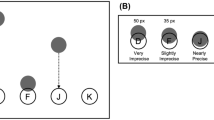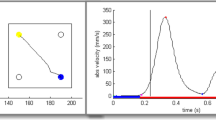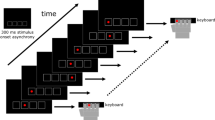Abstract
Although there still is conflicting evidence whether schizophrenia is a neurodegenerative disease, cognitive changes in schizophrenia resemble those observed during normal aging. In contrast to extensively demonstrated deficits in explicit learning, it remains unclear whether implicit sequence learning is impaired in schizophrenia and normal aging. Implicit sequence learning was investigated using a computerized drawing task, the ‘implicit pattern learning task (IPLT)’ in 30 stable patients with schizophrenia, 30 age-matched controls and 30 elderly subjects on two consecutive days and after 1 week (sessions 1, 2 and 3). Fixed sequence trials were intermixed with random trials, and sequence learning was assessed by subtraction of the response time in fixed sequence trials from random trials. Separate analyses of response times and movement accuracy (i.e., directional errors) were performed. Explicit sequence knowledge was assessed using three different awareness tasks. All groups learned equally during sessions 1 and 2. In session 3, control subjects showed significantly larger learning scores than patients with schizophrenia (p = .012) and elderly subjects (p = .021). This group difference is mainly expressed in movement time and directional errors. Patients with schizophrenia demonstrated less subjective sequence awareness, and both patients with schizophrenia and elderly subjects had less explicit sequence recall. Explicit recall was positively correlated with task performance in all groups. After a short 24 h interval, all subjects showed similar improvements in implicit sequence learning. However, no benefit of prior task exposure 1 week later was observed in patients with schizophrenia and elderly subjects compared to controls. As patients with schizophrenia and elderly both display less explicit sequence recall, the control group superiority after 1 week could be explained by an explicit learning component. The few patients with schizophrenia and elderly subjects who had some sequence recall could possibly utilize this explicit knowledge to improve their task performance but did this by distinct mechanisms.




Similar content being viewed by others
References
Adini Y, Bonneh YS, Komm S, Deutsch L, Israeli D (2015) The time course and characteristics of procedural learning in schizophrenia patients and healthy individuals. Front Hum Neurosci 9:1–16. doi:10.3389/fnhum.2015.00475
Alescio-Lautier B, Michel BF, Herrera C, Elahmadi A, Chambon C, Touzet C, Paban V (2007) Visual and visuospatial short-term memory in mild cognitive impairment and Alzheimer disease: role of attention. Neuropsychologia 45(8):1948–1960. doi:10.1016/j.neuropsychologia.2006.04.033
Ashe J, Lungu OV, Basford AT, Lu X (2006) Cortical control of motor sequences. Curr Opin Neurobiol 16:213–221. doi:10.1016/j.conb.2006.03.008
Baddeley A (2002) The handbook of memory disorders, 2nd edn. Wiley, Hoboken
Belgian Center for Pharmacotherapeutic Information (2016) Antipsychotics. Commented Drug Repertory 312–321
Bowie CR, Harvey PD (2006) Treatment of cognitive deficits in schizophrenia. Curr Opin Investig Drugs 7(7):608–613
Brown RM, Robertson EM, Press DZ (2009) Sequence skill acquisition and off-line learning in normal aging. PLoS One 4(8):e6683. doi:10.1371/journal.pone.0006683
Cornelis C, De Picker LJ, Hulstijn W, Dumont G, Timmers M, Janssens L, Sabbe BGC, Morrens M (2014) Preserved learning during the symbol digit substitution test in patients with schizophrenia, age-matched controls and elderly. Front Psychiatry. doi:10.3389/fpsyt.2014.00189
De Picker LJ, Cornelis C, Hulstijn W, Dumont G, Fransen E, Timmers M, Morrens M, Sabbe BGC (2014) Stable schizophrenia patients learn equally well as age-matched controls and better than elderly controls in two sensorimotor rotary pursuit tasks. Front Psychiatry 5(165):1–12. doi:10.3389/fpsyt.2014.00165
Destrebecqz A, Peigneux P (2005) Methods for studying unconscious learning. Prog Brain Res 150(6):69–80. doi:10.1016/S0079-6123(05)50006-2
Gaillard V, Cleeremans A, Destrebecqz A (2014) Dissociating conscious and unconscious learning with objective and subjective measures. Clin EEG Neurosci 45(1):50–56. doi:10.1177/1550059413516757
Gold JM, Hahn B, Strauss GP, Waltz J (2009) Turning it upside down: areas of preserved cognitive function in schizophrenia. Neuropsychol Rev 19(3):294–311. doi:10.1007/s11065-009-9098-x
Green MF, Heaton RK (2004) Longitudinal studies of cognition and functional outcome in schizophrenia: implications for MATRICS. Schizophr Res 72:41–51. doi:10.1016/j.schres.2004.09.009
Hardoy MC, Carta MG, Catena M, Hardoy MJ, Cadeddu M, Dell’Osso L, Carpiniello B (2004) Impairment in visual and spatial perception in schizophrenia and delusional disorder. Psychiatry Res 127(1–2):163–166. doi:10.1016/j.psychres.2004.03.002
Heaton R, Paulsen JS, McAdams LA, Kuck J, Zisook S, Braff D, Jeste DV (1994) Neuropsychological deficits in schizophrenics. Relationship to age, chronicity, and dementia. Arch Gen Psychiatry 51(6):469–476
Hikosaka O, Nakahara H, Rand MK, Sakai K, Lu X, Nakamura K, Doya K (1999) Parallel neural networks for learning. Trends Cogn Sci 22(10):464–471. doi:10.1016/S0166-2236(99)01439-3
Horan WP, Green MF, Knowlton BJ, Wynn JK, Mintz J, Nuechterlein KH (2008) Impaired implicit learning in schizophrenia. Neuropsychology 22(5):606–617. doi:10.1037/a0012602
Howard J, James H, Howard DV (2013) Aging mind and brain: is implicit learning spared in healthy aging? Front Psychol 4:1–6. doi:10.3389/fpsyg.2013.00817
Janacsek K, Nemeth D (2013) Implicit sequence learning and working memory: correlated or complicated? Cortex 49(8):2001–2006. doi:10.1016/j.cortex.2013.02.012
Kalkstein S, Hurford I, Gur RC (2010) Neurocognition in schizophrenia. Curr Top Behav Neurosci 4:373–390
Khosravani N, Goodarzi MA (2013) Patients with schizophrenia show deficits on spatial frequency doubling. Vis Res 93:49–53. doi:10.1016/j.visres.2013.10.007
King BR, Fogel SM, Albouy G, Doyon J (2013) Neural correlates of the age-related changes in motor sequence learning and motor adaptation in older adults. Front Hum Neurosci 7:1–13. doi:10.3389/fnhum.2013.00142
Kirkpatrick B, Messias E, Harvey PD, Fernandez-Egea E, Bowie CR (2008) Is schizophrenia a syndrome of accelerated aging? Schizophr Bull 34(6):1024–1032. doi:10.1093/schbul/sbm140
Kraepelin E (1971) Dementia praecox and paraphrenia. Robert E. Krieger Publishing Co., Inc., Huntington
Kravariti E, Toulopoulou T, Mapua-Filbey F, Schulze K, Walshe M, Sham P, McDonald C (2006) Intellectual asymmetry and genetic liability in first-degree relatives of probands with schizophrenia. Br J Psychiatry 188:186–187. doi:10.1192/bjp.bp.104.008177
Leucht S, Pitschel-Walz G, Abraham D, Kissling W (1999) Efficacy and extrapyramidal side-effects of the new antipsychotics olanzapine, quetiapine, risperidone, and sertindole compared to conventional antipsychotics and placebo. A meta-analysis of randomized controlled trials. Schizophr Res 35(1):51–68. doi:10.1016/S0920-9964(98)00105-4
Marvel CL, Schwartz BL, Howard DV, Howard J (2005) Implicit learning of non-spatial sequences in schizophrenia. J Int Neuropsychol Soc 11(6):659–667
Marvel C, Turner BM, O’Leary DS, Johnson HJ, Pierson RK, Boles Ponto LL, Andreasen NC (2007) The neural correlates of implicit sequence learning in schizophrenia. Neuropsychology 21(6):761–777. doi:10.1037/0894-4105.21.6.761
Mattay VS, Fera F, Tessitore A, Hariri AR, Das S, Callicott JH, Weinberger DR (2002) Neurophysiological correlates of age-related changes in human motor function. Neurology 58(4):630–635
Morrens M, Hulstijn W, Sabbe B (2006) Psychomotor slowing in schizophrenia. Schizophr Bull 33(4):1038–1053. doi:10.1093/schbul/sbl051
Morrens M, Hulstijn W, Sabbe B (2008) The effects of atypical and conventional antipsychotics on reduced processing speed and psychomotor slowing in schizophrenia: a cross-sectional exploratory study. Clin Ther 30(4):684–692. doi:10.1016/j.clinthera.2008.04.012
Mushquash AR, Fawcett JM, Klein RM (2012) Inhibition of return and schizophrenia: a meta-analysis. Schizophr Res 135(1–3):55–61. doi:10.1016/j.schres.2011.11.034
Nissen MJ, Bullemer P (1987) Attentional requirements of learning: evidence from performance measures. Cogn Psychol 19:1–32
Oostwoud WL, Brenner E, Smeets JBJ (2016) Exposing sequence learning in a double-step task. Exp Brain Res. doi:10.1007/s00221-016-4566-z
Pedersen A, Siegmund A, Ohrmann P, Rist F, Rothermundt M, Suslow T, Arolt V (2008) Reduced implicit and explicit sequence learning in first-episode schizophrenia. Neuropsychologia 46:186–195. doi:10.1016/j.neuropsychologia.2007.07.021
Perruchet P, Amorim MA (1992) Conscious knowledge and changes in performance in sequence learning: evidence against dissociation. J Exp Psychol Learn Mem Cogn 18(4):785–800
Poldrack RA, Packard MG (2003) Competition among multiple memory systems: converging evidence from animal and human brain studies. Neuropsychologia 41(3):245–251. doi:10.1016/S0028-3932(02)00157-4
Remillard G (2014) The study of sequence learning in individuals with schizophrenia: a critical review of the literature. J Neuropsychol 8:231–245. doi:10.1111/jnp.12022
Seger CA (1994) Implicit learning. Psychol Bull 115(2):163–196. doi:10.1037/0033-2909.115.2.163
Siegert RJ, Weatherall M, Bell EM (2008) Is implicit sequence learning impaired in schizophrenia? A meta-analysis. Brain Cogn 67(3):351–359. doi:10.1016/j.bandc.2008.02.005
Smith CD, Walton A, Loveland AD, Umberger GH, Kryscio RJ, Gash DM (2005) Memories that last in old age: motor skill learning and memory preservation. Neurobiol Aging 26(6):883–890. doi:10.1016/j.neurobiolaging.2004.08.014
Tang BCW, Lanigan CM, Dean B, Sutcliffe JG, Thomas EA (2009) Normal human aging and early-stage schizophrenia share common molecular profiles. Aging Cell 8(3):339–342. doi:10.1111/j.1474-9726.2009.00468.x
Van Tilborg IADA, Hulstijn W (2010) Implicit motor learning in patients with Parkinson’s and Alzheimer’s disease: differences in learning abilities? Mot Control 14:344–361
Van Tilborg IADA, Kessels RPC, Kruijt P, Wester AJ, Hulstijn W (2011) Spatial and nonspatial implicit motor learning in Korsakoff’s amnesia: evidence for selective deficits. Exp Brain Res 214(3):427–435. doi:10.1007/s00221-011-2841-6
Verneau M, van der Kamp J, Savelsbergh GJP, de Looze MP (2014) Age and time effects on implicit and explicit learning. Exp Aging Res 40(4):477–511. doi:10.1080/0361073X.2014.926778
Acknowledgments
The authors would like to thank Ms. Apers and Ms. Laureys for their support in the testing of the study participants. The authors also thank the study participants, without whom the study would never have been accomplished. This clinical trial was funded by Janssen Research & Development, a division of Janssen Pharmaceutica N.V., Beerse, Belgium. Co-authors P. de Boer, L. Janssens and M. Timmers are employees of Janssen Research and Development, A Division of Janssen Pharmaceutica N.V., Beerse, Belgium, and own shares in the company.
Author information
Authors and Affiliations
Corresponding author
Rights and permissions
About this article
Cite this article
Cornelis, C., De Picker, L.J., De Boer, P. et al. Implicit motor sequence learning in schizophrenia and in old age: reduced performance only in the third session. Exp Brain Res 234, 3531–3542 (2016). https://doi.org/10.1007/s00221-016-4751-0
Received:
Accepted:
Published:
Issue Date:
DOI: https://doi.org/10.1007/s00221-016-4751-0




